|
|
|
Sort Order |
|
|
|
Items / Page
|
|
|
|
|
|
|
| Srl | Item |
| 1 |
ID:
145401
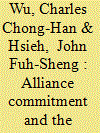

|
|
|
|
|
| Summary/Abstract |
Our study shows that alliance commitment is the key to the maintenance of the status quo between a weak challenger and a major-power attacker. In order to verify our theory, we employ data from Benson's typology of compellent military alliances and conduct empirical tests for our theoretical hypothesis. The statistical results comply with the theory, indicating that a trustful and strong military commitment creates negative effects on the status quo. We examine the cases of the Korean War and US-China-Taiwan relations to buttress our arguments. The latter case also shows the need to modify our original model under certain conditions.
|
|
|
|
|
|
|
|
|
|
|
|
|
|
|
|
| 2 |
ID:
145400
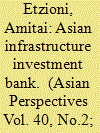

|
|
|
|
|
| Summary/Abstract |
Although some analysts have emphasized the importance of China's becoming a “responsible stakeholder” in the international order, the United States has in effect blocked China's full participation in a range of existing international institutions and attempted to undermine China's efforts to create and lead new international institutions. In this article I examine those US efforts, particularly with regard to the Asian Infrastructure Investment Bank, where the United States attempted to block other states from becoming members. I explore the difference between multifaceted and aggression-limiting containment and propose that the United States apply the latter to help stabilize Sino-US relations.
|
|
|
|
|
|
|
|
|
|
|
|
|
|
|
|
| 3 |
ID:
145406
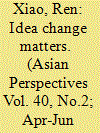

|
|
|
|
|
| Summary/Abstract |
In this article I examine the changes in China's foreign policy thinking and how they have influenced China's international behavior. I reveal how the leadership's beliefs guided and drove the Chinese state's behavior. When leaders believed that the world was in a “war and revolution” age, China was inclined to overlook the actual international order and institutions and backed revolutionary movements or armed struggles in other countries. The cognitive shift to “peace and development” in the 1980s, which was consolidated in the 1990s through two major debates, was fundamental in terms of strategically reshaping China's behavior, turning it from a revolutionary state into a quasi–status quo state. Besides embracing international institutions, China has also joined neighboring countries in creating new regional institutions and norms in East Asia. I argue that ideas, and not only perceptions, guide China's policymaking and international behavior.
|
|
|
|
|
|
|
|
|
|
|
|
|
|
|
|
| 4 |
ID:
145404
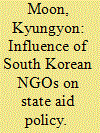

|
|
|
|
|
| Summary/Abstract |
I examine the experiences of South Korean nongovernmental organizations (NGOs) that provide aid to North Korea in order to assess the success and limitations of the NGO movement. With reference to the political role of NGOs in constructivist theory, I identify three factors that have hindered the formation of a sustainable partnership between the South Korean government and NGOs since the inter-Korean summit of 2000. First, South Korean NGOs have lacked consistent efforts toward transparency and accountability in operations and organizational management. Second, the great increase in inter-Korean cooperation and exchange after 2000 weakened the research, education, and advocacy function of NGOs. Third, aid NGOs failed to establish independent, diversified, and stable funding mechanisms, decreasing their capacity to act as cooperative partners of the government.
|
|
|
|
|
|
|
|
|
|
|
|
|
|
|
|
| 5 |
ID:
145405
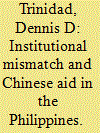

|
|
|
|
|
| Summary/Abstract |
Why is Chinese aid attractive to some recipient countries and controversial in others? This study advances the idea that Chinese aid is more attractive in countries that lack or have weak Development Assistance Committee–based aid institutions. When there is a mismatch between a non-DAC donor and a recipient country's aid regimes, legal and political problems may arise, as the case of Chinese aid to the Philippines in the 2000s demonstrates. As a recipient country, the Philippines is more accustomed to DAC-based rules and practices governing development aid processes, while as a donor country, China's aid institutions evolved outside the DAC club. The controversies that subsequently arose from institutional mismatch created a public perception that Chinese aid was illegal and prone to corruption, undermining China's aid objectives.
|
|
|
|
|
|
|
|
|
|
|
|
|
|
|
|
| 6 |
ID:
145403


|
|
|
|
|
| Summary/Abstract |
This article deals with the impact on the North Korean domestic situation produced by the 1989 visit to Pyongyang by Yim Su-gyong, a young student activist from South Korea. Going there in defiance of South Korea's official policy, she was enthusiastically welcomed by the North Korean authorities, who strove to present her as an embodiment of the alleged revolutionary spirit of South Korean youngsters. However, in the long run Yim's trip produced totally different results. The North Korean audience, fascinated with Yim Su-gyong and quite attentive to her behavior, was able to read hints that indicated the official picture of South Korean life as presented by the North Korean media was wrong. Contrary to the authorities' initial expectations, the trip made North Koreans more skeptical of the officially approved worldview.
|
|
|
|
|
|
|
|
|
|
|
|
|
|
|
|
|
|
|
|
|